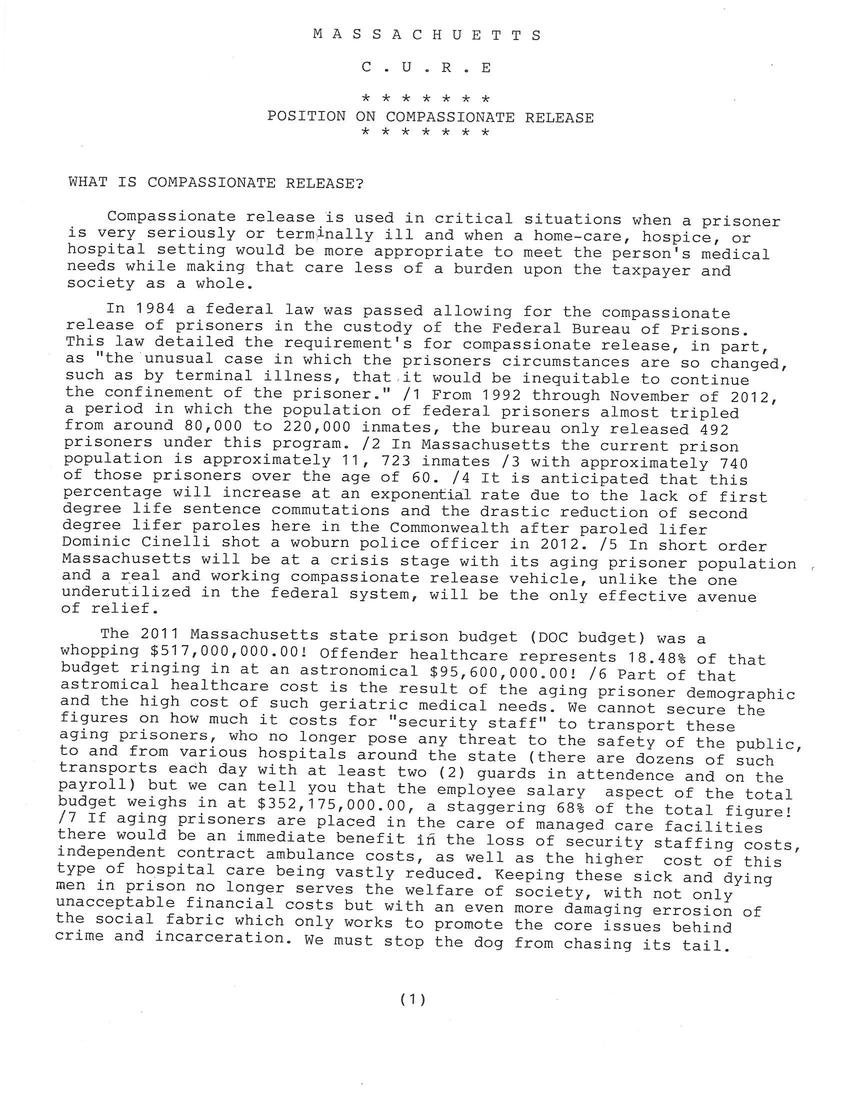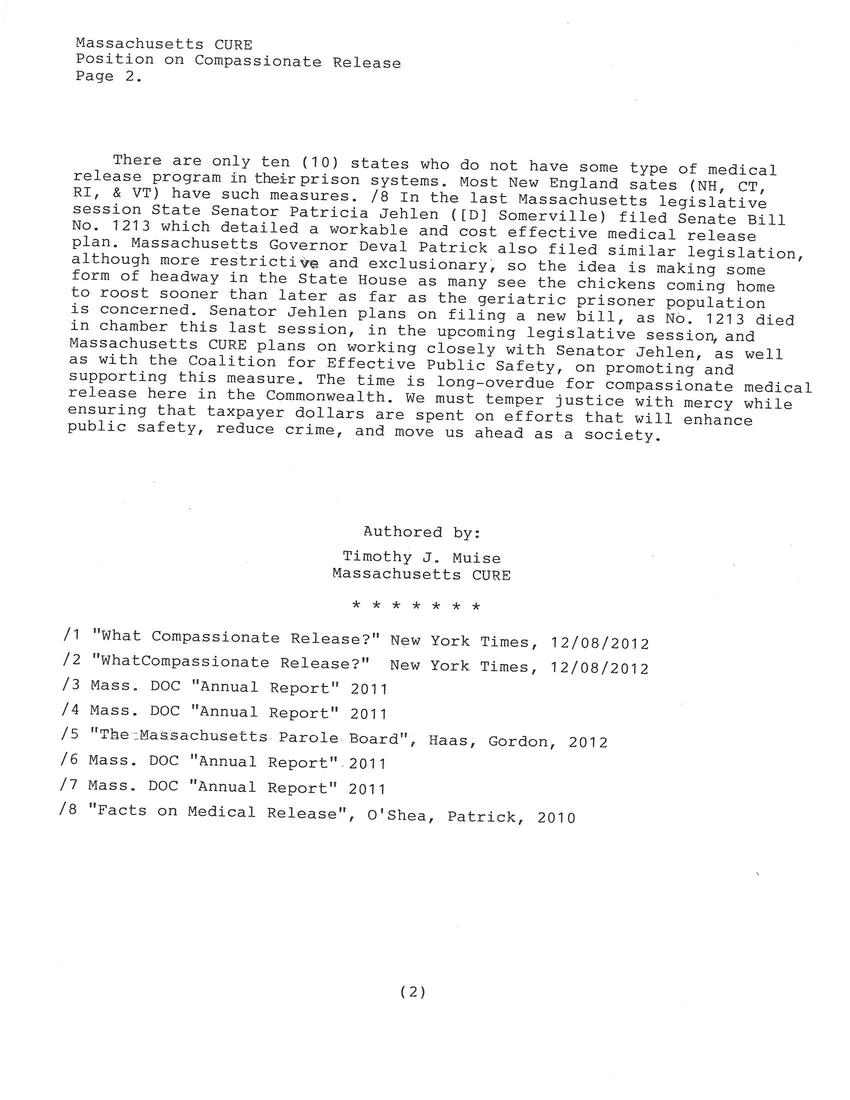
Transcription
MASSACHUSETTS
C.U.R.E.
*******
POSITION ON COMPASSIONATE RELEASE
*******
WHAT IS COMPASSIONATE RELEASE?
Compassionate release is used in critical situations when a prisoner is very seriously or terminally ill and when a home-care, hospice, or hospital setting would be more appropriate to meet the person's medical needs while making that care less of a burden upon the taxpayer and society as a whole.
In 1984 a federal law was passed allowing for the compassionate release of prisoners in the custody of the Federal Bureau of Prisons. This law detailed the requirements for compassionate release, in part, as "the unusual case in which the prisoner's circumstances are so changed, such as by terminal illness, that it would be inequitable to continue to confinement of the prisoner." /1 From 1992 through November of 2012, a period in which the population of federal prisoners almost tripled from around 80,000 to 220,000 inmates, the bureau only released 492 prisoners under this program. /2 In Massachusetts the current prison population is approximately 11,723 inmates /3 with approximately 740 of those prisoners over the age of 60. /4 It is anticipated that this percentage will increase at an exponential rate due to the lack of first degree life sentence commutations and the drastic reduction of second degree lifer paroles here in the Commonwealth after paroled lifer Dominic Cinelli shot a Woburn police officer in 2012. /5 In short order Massachusetts will be at a crisis stage with its aging prisoner population and a real and working compassionate release vehicle, unlike the one underutilized in the federal system, will be the only effective avenue of relief.
The 2011 Massachusetts state prison budget (DOC budget) was a whopping $517,000,000.00! Offender healthcare represents 18.48% of that budget, ringing in at an astronomical $95,600,000.00! /6 Part of that astronomical healthcare cost is the result of the aging prisoner demographic and the high cost of such geriatric medical needs. We cannot secure the figures on how much it costs for "security staff" to transport these aging prisoners, who no longer pose any threat to the safety of the public, to and from various hospitals around the state (there are dozens of such transports each day with at least two (2) guards in attendance and on the payroll) but we can tell you that the employee salary aspect of the total budget weighs in at $352,175,000.00, a staggering 68% of the total figure! /7 If aging prisoners are placed in the care of managed care facilities there would be an immediate benefit in the loss of security staffing costs, independent contract ambulance costs, as well as the higher cost of this type of hospital care being vastly reduced. Keeping these sick and dying men in prison no longer serves the welfare of society, with not only unacceptable financial costs but with an even more damaging erosion of the social fabric which only works to promote the core issues behind crime and incarceration. We must stop the dog from chasing its tail.
There are only ten (10) states who do not have some type of medical release program in their prison systems. Most New England states (NH, CT, RI, & VT) have such measures. /8 In the last Massachusetts legislative session State Senator Patricia Jehlen ([D] Somerville) filed Senate Bill No. 1213 which detailed a workable and cost effective medical release plan. Massachusetts Governor Deval Patrick also filed similar legislation, although more restrictive and exclusionary, so the idea is making some form of headway in the State House as many see the chickens coming home to roost sooner than later as far as the geriatric prisoner population is concerned. Senator Jehlen plans on filing a new bill, as No. 1213 died in chamber this last session, in the upcoming legislative session, and Massachusetts CURE plans on working closely with Senator Jehlen, as well as with the Coalition for Effective Public Safety, on promoting and supporting this measure. The time is long-overdue for compassionate medical release here in the Commonwealth. We must temper justice with mercy while ensuring that taxpayer dollars are spent on efforts that will enhance public safety, reduce crime, and move us ahead as a society.
Authored by:
Timothy J. Muise
Massachusetts CURE
*******
/1 "What Compassionate Release?" New York Times, 12/08/2012
/2 "What Compassionate Release?" New York Times, 12/08/2012
/3 Mass. DOC "Annual Report" 2011
/4 Mass. DOC "Annual Report" 2011
/5 "The Massachusetts Parole Board, Haas, Gordon, 2012
/6 Mass. DOC "Annual Report" 2011
/7 Mass. DOC "Annual Report" 2011
/8 "Facts on Medical Release", O'Shea, Patrick, 2010
Other posts by this author
|
2017 jun 24

|
2017 jun 24

|
2017 jun 24

|
2017 jun 24

|
2017 jun 18

|
2017 jun 15

|
More... |



Replies